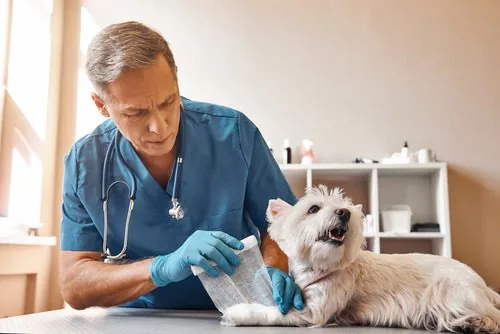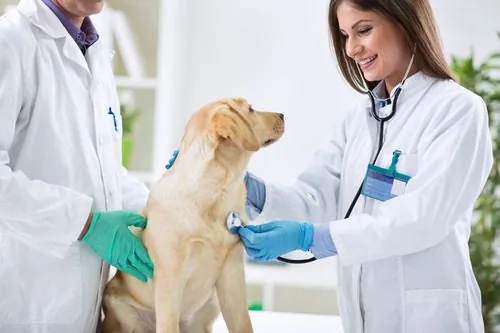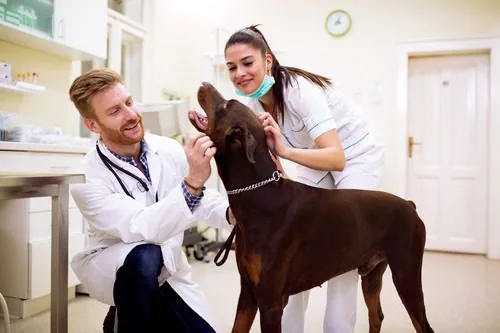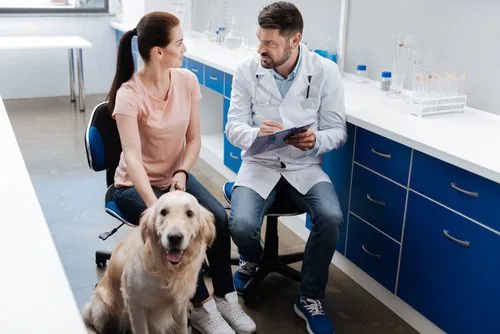Hot Spots on Dogs: When to See a Veterinary Dermatologist
Do you notice anything unusual with your dog’s skin and wonder how it should be treated? Hotspots can trigger a chewing, scratching, and licking cycle that can cause lesions on your dog’s skin.
You should see a veterinary dermatologist if your dog is constantly itching, having an allergic reaction, or if they are losing patches of hair. A severe rash can result from persistent irritation to the site. Hotspots should be treated promptly, as they are painful and can become infected.
Hotspots are inflamed, moist areas of the skin that may be oozing or can contain pus. If you want to know more about hotspots on dogs and when to see a veterinary dermatologist, check out this informative article.

What Are Hot Spots?
Canine hot spots can also be referred to as acute moist dermatitis. They are localized patches of skin that the dog has perpetuated on their own through constant scratching, licking, or chewing. Hot spots have the following characteristics:
- Inflamed
- Moist
- Red
- Raw
A hot spot is generally an open wound and can be affected by a secondary bacterial infection. It may start as a slight itch, but then a cycle begins in which the dog repeatedly continues the action, making it worse, and it is usually quite painful for them.
As the hot spot worsens, you will likely see dried pus and a damaged skin surface. A dog may lose hair in the infected area, and the skin typically appears raw. The hotspot may ooze, bleed, or contain pus.
What Causes Hotspots?
Hot spots can be severe and particularly offensive when they appear. Licking, chewing, and scratching at the area worsen the sore and can trigger infection. It is essential to find out how the hotspots form so they can be treated appropriately. The following includes some of the major underlying causes of hotspots:
- Anal sac disease- Anal sac disease can trigger licking and chewing, resulting in a sore
- Poor grooming habits- Matted or dirty hair can cause the dog to bite at the tangles, creating an open wound
- Atopic dermatitis- Eczema leads to dry, itchy, angry skin, causing the dog to scratch nonstop
- Skin infections- Bacteria and fungi can lead to constant itching, causing excessive scratching at the site
- Separation anxiety- Can result in extreme boredom or loneliness, causing the dog to scratch and bite out of anxiety
- Contact irritants- Skin irritants like poison ivy can trigger itching and scratching
- Parasites- Ticks, mites, or lice can lead to obsessive-compulsive itching and scratching
- Allergies- Food, seasonal, or fleas, skin-related allergies can cause itching, scratching, and licking
An ear infection can also lead to skin rashes and scratching, causing a hotspot to develop. If your dog has arthritis, they may itch or lick at the painful area to relieve the soreness. Bacterial imbalance arises from constant licking, scratching, and chewing. The immune system reacts, and an unhealthy cycle ensues, involving more itching, scratching, and chewing.
What Are the Symptoms of Hotspots?
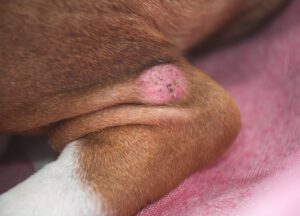
A hot spot develops from a small, localized, itchy skin patch, gradually becoming more prominent and irritating. Your dog will continue the cycle as the hotspot grows. The hotspot turns painful and infected. Some of the symptoms of hotspots are:
- The chewing, scratching, and licking cycle
- Swelling and irritation
- Dry, flaky skin
- Hair loss
Moist, matted fur, and a putrid smell coming from the site are also symptoms of hotspots. There may also be crusty scabs, pus, or liquid oozing from the lesions. If your pup has a hotspot, it is often painful, and they may become low-spirited and agitated.
When to See a Veterinary Dermatologist?
It is not always clear what is happening with your dog when you see they have a skin issue. However, there are a few key signs that your pup needs to see a veterinary dermatologist, especially if you suspect a hotspot. You should observe your dog enough to be able to spot the following issues:
Constant Itching
If you see your pup scratching at themselves constantly, there may be an issue with their skin that a specialist should address. Your pup may even run their skin against the floor to relieve the itch. A hotspot can easily result from intense scratching sessions.
Allergic Reactions
Skin ulcers, constant itching, and hot spots could all be a symptom of an allergic reaction. A veterinary dermatologist is better equipped to narrow it down, and you can have your pup treated for the underlying cause and the resulting skin issue.
Fleas
A lot of times, when the skin is inflamed, fleas or ticks can be the culprit. Even a flea bite is enough to incite persistent itching and scratching. Fleas can lay up to 40 eggs daily on your dog’s skin, equating to serious itching and triggering inflammation.
Hair Loss
Several factors, including skin allergies and intense itching, can cause alopecia. Biting, chewing, and licking can create significant patches of baldness. Continuous scratching can result in infection and is one of the crucial symptoms of hot spots.
Persistent Rash
Your dog can develop skin inflammation or a persistent rash, which skin irritants like mites, ticks, or lice can cause. Rashes can also result from obsessive-compulsive habits due to anxiety, nervousness, or boredom. Rashes can trigger severe itching, which can lead to a hotspot.
How to Treat a Hotspot
Your vet will need to shave or clip around the infected area so it becomes dry, as hotspots tend to be moist, and it will also keep hair out of the site. The hotspot should be cleaned with chlorhexidine to extract dirt and debris from the site. You can help move the healing along by using a warm compress three times daily to restore circulation.
Your vet may order topical antibiotics if the area is infected, or if it is not yet infected, you can use an antibiotic cream like Neosporin. If the infection worsens, your vet will prescribe oral antibiotics, which is ideal since the medicine goes to the bloodstream.
Conclusion
Hotspots are incredibly itchy and painful for your canine companion. If your dog is itching, has allergies, or is missing hair, a veterinary dermatologist may be the appropriate path to treating your pup.
Are you looking for a veterinarian for your pet? Veterinary Healthcare Associates in Winter Haven, FL is here to help. Give us a call at (863) 324-3340 today!
Recent Posts
Working at a 24/7 Emergency Veterinary Practice
Working at a 24/7 Emergency Veterinary Practice Working at a 24/7 emergency veterinary practice is a unique…
Do Veterinarians Have a Good Work-Life Balance?
Do Veterinarians Have a Good Work-Life Balance? When it comes to the dedicated professionals who care for…
6 Reasons to Work in a Specialty Referral Veterinary Practice
6 Reasons to Work in a Specialty Referral Veterinary Practice Working in the veterinary field is incredibly…
Is Being an Oncology Veterinarian a Rewarding Career?
Is Being an Oncology Veterinarian a Rewarding Career? Choosing a career path in veterinary medicine opens the…
Canine Water Treadmill Therapy
Canine Water Treadmill Therapy Welcome to our informative guide on Canine Water Treadmill Therapy. This revolutionary rehabilitation…
About Veterinary Healthcare Associates
Veterinary Healthcare Associates in Winter Haven, FL, was established over 30 years ago as Maxwell Animal Clinic by Dr. John Maxwell. Maxwell Animal Clinic was a one-doctor general practice offering preventive care, dentistry, and standard surgical services to the community. As the years passed, Maxwell Animal Clinic evolved into a thriving 10-doctor general, specialty referral, and emergency veterinary practice.

